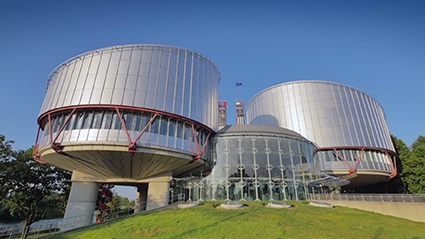Lawsuits against Russia
On August 21, the Ministry of justice of Georgia filed a lawsuit with the European Court of Human Rights (ECHR) against the Russian Federation in connection with the breakaway region of Tskhinvali (South Ossetia).
According to the Ministry of Justice, the purpose of the interstate lawsuit is to address the administrative practice of mass infringement of rights.
“The lawsuit concerns the administrative practice of mass repression, arrests, attacks and killings of the population of Georgia living in the occupied territories and on the so-called occupation line, which increased especially after the 2008 war and reached a critical point in February of this year with the torture and murder of Archil Tatunashvili,” stated the Ministry.
Georgia is demanding that the European Convention on Human Rights establish Russia’s accountability for violating several articles of the ECHR. Georgia claims that by occupying the territories, installing barbed wire and targeting the citizens of Georgia, Russia violates such articles of the European Convention as the right to life, the prohibition of torture, the right to freedom and security, as well as the right to property and freedom of movement.
The Ministry of Justice further stated that these violations are aggravated by the fact that Russia has a discriminatory motive aiming to intimidate and infringe on the rights of ethnic Georgians. Supporting evidence was submitted to the court along with the claim.
The lawsuit strongly revolves around the cases of Archil Tatunashvili, Gigla Otkhozoria and David Basharuli. Tatunashvili was detained in late February by de facto South Ossetian forces, tortured using various methods and as a result died. The murder of Otkhozoria in the Gali district on May 19 2016, flared tensions in the Georgian and Abkhaz communities. Basharuli, a Georgian citizen who went missing in the town of Akhalgori in Georgia’s Russian-occupied Tskhinvali region, was found dead six months later on 5 January 2015. As part of the suit, the Ministry emphasizes that some of the individuals responsible have already been identified, but Georgia has no way to bring these perpetrators to justice.
“So far, the scene of the incident has not been inspected. Representatives of the occupation regime refuse to hand over the internal organs, mobile phone and clothes of Archil Tatunashvili worn at the time of torture and death. It is impossible to interrogate the witnesses who live in the territory of the occupied Tskhinvali region and have important information on the matter. It is also impossible to arrest the perpetrators, since they are on the occupied territory,” stated the Ministry
The Ministry of Justice says that a full investigation is impeded both by the Russian Federation and the de facto territories it controls. This is the third interstate lawsuit between Georgia and Russia in the Strasbourg Court, the first case being concerned with the deportation of citizens of Georgia from Russia, ending in a victory for the Georgian side.
The main evidence in the case is an official conclusion drawn up by commissioned forensic expertise from the Empathy Center. The conclusion was prepared in accordance with international standards, including the Istanbul and Minnesota protocols on torture. Two experts of international standing were also involved in the preparation.
The document confirms that Archil Tatunashvili was brutally tortured in Tskhinvali and that this was the eventual cause of his death.
In order to start considering the case, the European Court for Human Rights must first accept the claims that Georgia has filed. Even if this happens in a short time, no one can say for sure what time frame is required for a substantial review of the case. Considering prior claims, the process will more than likely take years.
The second suit against Russia was launched independently by Giorgi and Rusudan Tatunashvili, the parents of Archil Tatunashvili. The Ossetian side claimed that the 35-year-old ‘fell down the stairs of the detention center on the night of 23 February and died from heart failure in a Tskhinvali hospital. Doubts about this version of the story were further fueled by Tskhinvali’s refusal to transfer Tatunashvili’s body to Georgia proper for almost a month, after which an autopsy found that several internal organs were missing.
The claim submitted to the court on behalf of the Tatunashvili family was prepared by the Empathy Center. The NGO explained that according to the lawsuit, 300 thousand Euros were claimed in compensation, but “the money means nothing to the family.”
Georgia has also been waiting eight to nine years for numerous individual suits related to the August War to be considered, including a lawsuit filed on behalf of the children of Giorgi Antsukhelidze, a National Hero of Georgia.
The European Union continues to express full support of Georgia’s territorial integrity within its internationally recognized borders, referring to the Russian policy of "borderization" as a "creeping form of territorial annexation."
But other lawsuits against Russia at the ECHR seeking compensation for displaced ethnic Georgians who lost all their property in South Ossetia as a result of the 2008 war, remain unresolved.
By Shawn Wayne












